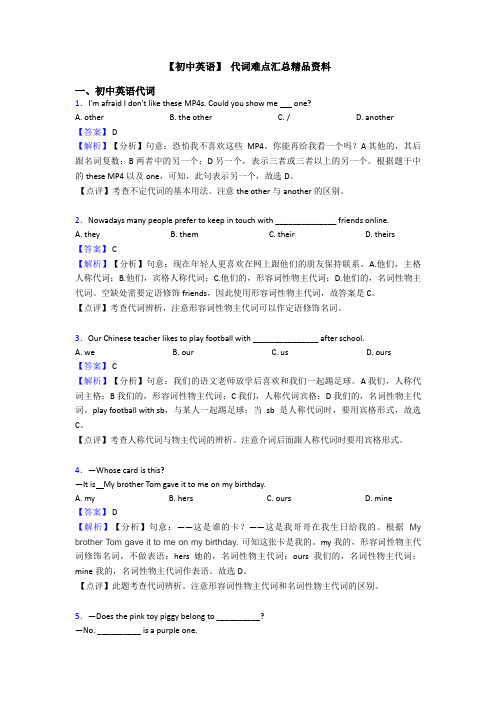代词难点一点通概要
- 格式:doc
- 大小:105.00 KB
- 文档页数:14





【初中英语】代词难点汇总精品资料一、初中英语代词1.I'm afraid I don't like these MP4s. Could you show me one?A. otherB. the otherC. /D. another【答案】 D【解析】【分析】句意:恐怕我不喜欢这些MP4。
你能再给我看一个吗?A 其他的,其后跟名词复数;B 两者中的另一个;D 另一个,表示三者或三者以上的另一个。
根据题干中的these MP4以及one,可知,此句表示另一个,故选D。
【点评】考查不定代词的基本用法。
注意the other与another的区别。
2.Nowadays many people prefer to keep in touch with ______________ friends online. A. they B. them C. their D. theirs【答案】 C【解析】【分析】句意:现在年轻人更喜欢在网上跟他们的朋友保持联系。
A.他们,主格人称代词;B.他们,宾格人称代词;C.他们的,形容词性物主代词;D.他们的,名词性物主代词。
空缺处需要定语修饰friends,因此使用形容词性物主代词,故答案是C。
【点评】考查代词辨析,注意形容词性物主代词可以作定语修饰名词。
3.Our Chinese teacher likes to play football with _______________ after school.A. weB. ourC. usD. ours【答案】 C【解析】【分析】句意:我们的语文老师放学后喜欢和我们一起踢足球。
A 我们,人称代词主格;B 我们的,形容词性物主代词;C 我们,人称代词宾格;D 我们的,名词性物主代词。
play football with sb,与某人一起踢足球;当sb是人称代词时,要用宾格形式,故选C。
【点评】考查人称代词与物主代词的辨析。

代词难点,疑点讲解老张编印代词就是用来代替名词,形容词或数词的词。
如you, many等。
代词可分为九大类:<1>人称代词:I, you ,he, she, me, him, her, we, us etc<2>物主代词:my, mine, his, his, her, hers, your, yours etc<3>反身代词:myself, yourself, ourselves, himself, herself etc<4>相互代词:each other, one another<5>指示代词:this, these, that, those, such<6>疑词代词:who, what, which, whose etc<7>关系代词:who, which, that, whose, whom, as etc<8>连接代词:who, which, what, whose etc<9>不定代词:some, any, none, each, every, other ,another sth(所有代词都兼有名词和形容词性质)Ⅰ人称代词:I.主要掌握何时用主格,何时用宾格。
如强调句型:It was he who came late.It was him that I saw yesterday.宾格特殊用法:1)对话:I am at peace with all men. __Me, too.Who wants to try first? __Me,sir.I want an apple._Me, too.2)用于表示惊奇,怀疑,否定,蔑视,驳斥等感情色彩的无谓语句。
You ought to pay the bills._what, me?Me! Marry a poor girl? _No, not me!He teaches English._Him teach English?(No, he can’t teach English)Me married? I don’t think.What! Me say sorry to him? No!“Me? A dog?” it seemed to say with its strong body and sharp white teeth.3)There/Here be句型Come and dine with us. There’ll only be us three.Here’s me a middle school English teacher.4)注意在介词between…and…,but, except, with后面宾格。
语法填空代词解题技巧摘要:一、引言二、代词的分类及作用1.人称代词2.物主代词3.指示代词4.疑问代词5.反身代词6.相互代词三、语法填空解题技巧1.分析语境,确定代词类型2.注意代词的上下文搭配3.避免混淆不同代词的用法四、实用例题解析1.解析12.解析23.解析3五、总结与建议正文:一、引言作为一名学生,我们在英语学习中会遇到各种语法题型,其中语法填空题是一个重要的组成部分。
在这类题型中,代词的填空往往让我们感到困惑。
今天,我们就来探讨一下语法填空中的代词解题技巧,帮助大家更好地应对这类题目。
二、代词的分类及作用1.人称代词:代人,例如:I(我),you(你),he(他),she(她),we (我们),they(他们/她们)。
2.物主代词:表示某人的某物,例如:my(我的),your(你的),his (他的),her(她的),our(我们的),their(他们的/她们的)。
3.指示代词:表示距离说话人较近的人或物,例如:this(这个),that (那个),these(这些),those(那些)。
4.疑问代词:用于提问,例如:who(谁),what(什么),which(哪一个),whose(谁的)。
5.反身代词:表示某人自己,例如:myself(我自己),yourself(你自己),himself(他自己),herself(她自己),ourselves(我们自己),themselves(他们/她们自己)。
6.相互代词:表示彼此,例如:each other(彼此),one another(彼此)。
三、语法填空解题技巧1.分析语境,确定代词类型。
在做题时,首先要仔细阅读题目,理解语境,根据语境判断需要填入的代词类型。
2.注意代词的上下文搭配。
在填空时,要注意上下文之间的关系,确保填入的代词与句子其他部分搭配正确。
3.避免混淆不同代词的用法。
不同类型的代词在用法上有所区别,要避免在填空过程中混淆它们的用法。
必备英语代词难点、易错点一、初中英语代词1.We just hope that Tom will bring _______________ good news back home this time. A. a few B. some C. many D. little【答案】 B【解析】【分析】句意:我们只希望汤姆这次能带些好消息回家。
A 一些,其后跟可数名词复数;B 一些,后跟可数名词复数或不可数;C 一些,很多,后跟可数名词复数;D 几乎没有,其后跟不可数名词。
根据题干中的hope,可知此句表示肯定意义,且news是不可数名词,故选B。
【点评】考查不定代词的辨析。
注意熟记不定代词的基本含义及用法。
2.My grandparents still live in that old village the local government has decided to keep.A. whichB. whereC. whenD. what【答案】 A【解析】【分析】句意:我的祖父母们仍然住在那个当地政府已经决定了保留的旧村庄。
通过分析句子成分可知,这是一个定语从句,先行词是old village指物,要用关系代词which来引导,故选A。
【点评】考查定语从句,注意选择正确的关系代词。
3.— What kind of books do you like?—I like the books are about powerful and successful people.A. thatB. whoC. whomD. whose【答案】 A【解析】【分析】句意:——你喜欢什么样的书?——我喜欢那些关于有权势和成功人士的书。
A:that 没有词义,关系代词,作主语或宾语;B:who谁,作主语或宾语;C:whom谁,宾格,用在介词之后;D:whose谁的,作定语;由句子结构可知,是定语从句,先行词books,指物,在参加中作主语,要用关系代词that。
2012高考英语代词中的两大重点和两大难点重点1 人称代词1. 人称代词作主语时要用其主格形式,作宾语或表语时,通常用其宾格形式,但强调句除外,强调句中人称代词的使用应该看人称代词具体作什么成分。
2. 人称代词单独使用时,一般不用主格而用宾格。
重点2 不定代词不定代词是代词的核心内容,也是极不容易掌握的语法知识,其中有些不定代词极易混淆。
高考主要考查不定代词的辨析,着重考查以下内容:1. some, any的区别some一般用于肯定句,表示"一些",也可用于疑问句,表示请求、邀请、建议等,往往期望对方给予肯定的答复;any一般用于疑问句和否定句,此时仅仅起加强语气的作用,本身没有实际意义,但也可用于肯定句,当"任何,任何一个"讲。
2. something, anything, nothing的区别something一般用于肯定句,表示"某事,某物",也可以用于疑问句,表示请求、邀请、征询意见等;anything表示"任何东西,任何事物",一般用于否定句、疑问句或条件句,也可用于肯定句,当"任何事情"讲;nothing表示"没有什么,没有一件东西",常用于陈述句,表示否定意义。
3. none, no one, nothing的区别none既可指人,也可指物,侧重数量,通常指三者或三者以上的人或物,后可接of短语,作主语时谓语动词可用单数,也可用复数,常用来回答由h ow many/much引导的疑问句;no one只能指人,是泛指概念,常用来回答由wh o引导的疑问句,不与of短语连用,作主语时,谓语动词用单数;nothing,常用来回答由what引导的疑问句。
4. another, other的区别another泛指同类事物中的三者或三者以上的"另一个",只能代替或修饰单数可数名词。
代词难点一点通no adj. & adv.△ No the teachers went on strike.×There are no any students in the classroom. ×1.修饰可数名词单数时,no = not aI have no friends. = I don’t have a friend.There’s no bus. = There’s not a bus.2. 修饰可数名词复数和不可数名词时,no = not anyTher e are no people in the room. = There aren’t any people in the room.I have no time. = I have not any time.There is no water in the glass. = There isn’t any water in the glass.3. no修饰名词时,这个名词前不能有冠词 (a / the)、物主代词(my / your…)、指示代词(this / that) 或all / every,如果有,要改为none of…。
none of = not any ofNone of my friends came to the party. = Not any of my friends came to the party. No teachers went out. (不说No the teachers went out.)none 指人或指物, 其后常接of短语。
none of + 复数名词(或代词),其后的动词单复均可。
none of + 物质名词或抽象概念,其后的动词要用单数。
None of them have / has seen him.None of this money belongs to me.None of her relations are / is interested.none 还可以单独使用,如:“Is there any coal left?”“No, none at all.”“How many students are there in the classroom?”“None.”“How many of the books have you read?”“None at all.”“How much water left is there in the bottle?”“None.”比较:No one thinks he is clever. (= Nobody thinks he is clever.) No one knows what they fought about.No one likes a person with bad manners.“Who are you speaking to?”“No one.” (or: Nobody)“Who(m) did you see enter the lonely house?”“Nobody.” (or: No one)△ No one of us attended the meeting. ×I’ve read no one of his books.×1. none 用来指人或物;no one (= nobody) 主要用来指人 (= not even one 意为:连一个也没有,语气重)。
2. none常接of 短语;no one 不能接of 短语。
3. 作主语时,none 后面的名词为复数时,动词可用单数或复数;no one 只用作单数,动词也用单数。
4. none 往往用在一定的范围内;no one 没有范围限制。
5. 回答who引导的问句用no one或nobody;回答how many或how much引导的问句用none。
6. 当谈到两个人或事时,不用no 或none,而用 neither。
much / many△John’s got many friends because he’s got much money.Tom talks much.1.much 修饰不可数名词,many 修饰可数名词,它们多用在否定句或疑问句中;在肯定句中多用a lot of, lots of, plenty of,如:Are there many people in the street? (改用any意思不同)Tom hasn’t many books. (改用any意思不同)He doesn’t know much English.Did you have much trouble with the customs?2.many 和many 在较为正式的文体中可以用在肯定句中,特别是在句首时,如:Many machines at the exhibition are made in China.Much steel has been saved.3.在肯定句中,在too, so, as之后,以及在某些含有very的词语中,常用many和much,这是正常的,如:Tom talks too much.There’s so much violence these days.Try to get as many opinions as you can.You’ve bought too many tomatoes.4.在由whether / if 引导的从句中,要用many或much。
They doubt whether he has much knowledge on that subject.few / a fewTom has a few friends besides you. (作定语)Tom has a few friends besides you.Few of them are any good. (作主语)A few of them are good.I know few of these people. (作宾语)I know few of these people.1. few修饰可数名词复数。
2. few (= not many; hardly any)含否定意义;a few (= some; several; a small number of) 含肯定意义。
3. not a few = no few = quite a few = a good few = many。
4.当 few受 every, last, past, next, some, very等词所修饰时,表示肯定意义,few 之前不再有冠词。
如:In the last few minutes, he checked up his paper again.It took us some few days to repair the machine.They are very few in number.There were too few of them.He goes to see his grandma every few weeks.5.在非正式文体中很少见,一般用或代替,如:Only a few people attended the meeting.little / a littleLittle remains to be done about it. (作主语)A little remains to be done.Please give me a little. (作宾语)He knows a little of everything.There is very / but little time left. (作定语)Don’t worry; you still have a little time.1. little修饰不可数名词,表示“量”。
2. little含否定意义(反义词:much);a little含肯定意义(反义词:none)。
3.在非正式英语中,一般很少用little,常用not much, only a little来代替,如:We haven’t got much money / time.each1.each作为限定词用(作定语),后接单数可数名词,如:Each day is better than the one before.There is a line of trees on each side of the street.注:可以说:each sister, my sister(s),但不可以说:each my sister。
2.当名词前有另一个限定词(冠词、物主代词、指示代词)时,要用each of,(这时的each 是代词)后接复数名词,如:Each of my aunts gave me socks for Christmas.I’ve invited each of the students in turn.注:名词前没有其他限定词不用each of,所以不能说:Each of aunts…。
3.each作为代词,也可以用在人称代词前,这时须加of,作主语时动词要用单数,如:Each of them / us had a try.Each of them is broken. (cf. Each of the cups is broken.)Each of them has his own duty.4.each本身可以独立用作代词,后面不接名词,不用of,作主语时动词要用单数,如:Each has his merits.I had some crazy dreams last night. Each was funnier than the last.注:在这种情况下,以用each one为宜,显得更自然:Each one was perfect.Each one was funnier than the last.5.each可以跟在主语之后作同位语,这时主语和动词均为复数,如:We each have our own attitude to bringing up children.The boys each have a new bike.注:动词为 be或有助动词时,each应放在其后。
His sisters have each married businessmen.The witnesses were each perfectly certain of what they said.6.each还可以放在间接宾语之后,但一般不用在直接宾语的后面,如:She sent the children / them each a present.不说:She kisses them each.7.each还可以作副词,如:Give them two books each. (= Give each of them two books.)The students have ten books each.each / every1.each从个体着眼,强调“每个”人或物的个别情况,表示“各个”;every从整体着眼,强调共同性,意为“个个都”(= all),但有时在句中使用时并无太大的区别,如:You look more beautiful every / each time I see you.I know every / each member of the family.Each / Every man carried a box on his shoulder.2.each用于两者或两者以上;every用于三者或三者以上。